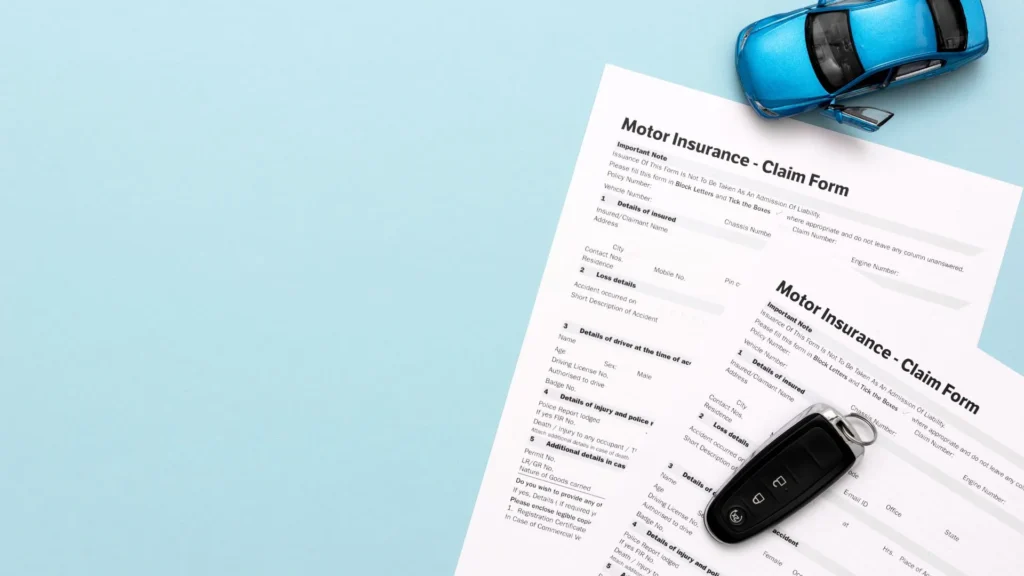You may have heard of the term “deductible” when purchasing insurance or filing a claim. But you may wonder: how does car insurance deductible work? A car insurance deductible is an out-of-pocket payment before your coverage takes effect. When shopping for or comparing car insurance policies, the deductible you choose directly impacts your premiums and up-front costs.
What is Car Insurance Deductible?
Risk-sharing is achieved through deductibles. You agree to shoulder a portion of the financial burden associated with an insurance claim – either a fixed amount or a set percentage – to protect yourself against covered events or losses. Your insurer will pick up the rest of the bill if your claim is approved and you pay the deductible amount stipulated in your policy.
When you purchase your policy, you choose a deductible. It may be possible to adjust it during a policy term, after a life-changing event, or when you renew your policy, depending on the policy type and insurer. It is typically cheaper to pay a lower premium when you choose a higher deductible. This will save you money upfront because you’ll assume more risk if you suffer a loss, such as a car wreck, or need medical treatment. A lower premium may save you money in the long run, but high out-of-pocket costs may negate savings.
How Does Car Insurance Deductible Work?
What kind of policy you have will determine the kind of coverage you have. The deductible amount you pay for each claim you make on your auto, home, and renters insurance policies is the same every year.
So, how does a car insurance deductible work? Let’s say you have a $1,000 deductible on your home insurance. The adjuster determines your policy covers $10,000 of damage caused by a kitchen fire one day. You will get a check for $9,000, representing the $10,000 cost minus the $1,000 deductible. The exact amount of damage is caused by another incident later that year. Any claims settlement will be subject to that $1,000 deductible once again.
In the case of health insurance, things work differently. The deductible does not apply to each claim individually but instead represents the total amount you must pay yearly for covered procedures and services. Once you reach that threshold, your insurer should cover the entire cost or a large percentage (such as 80% or 90%) of future approved treatments. Copayments, the set amount you agree to pay for services such as checkups or lab tests, may still apply according to your policy.

Car Insurance Deductibles Based on Coverage
Car insurance deductibles can be encountered with several types of auto coverage, but are most likely to occur with:
Comprehensive Coverage
Although comprehensive coverage sounds like it covers everything, it doesn’t. It applies to damage caused by events other than collisions, like severe weather or wildfires, or by theft or vandalism. Your coverage is limited to the actual cash value of your vehicle, and deductibles range from $100 to $1,000. According to experts, you should choose one according to the value of your car.
Collision Coverage
It applies to damage to your vehicle caused by hitting something like a utility pole or another vehicle. In the event of an accident, the collision insurance deductible will only apply to repairs or replacements. Any damage caused to another person’s property would be covered under your liability insurance instead, and liability insurance has no deductible. Depending on the policy, collision coverage deductibles can range from a few hundred dollars to over $1,000, or you may even be able to waive them altogether.
Personal Injury Protection
In addition to covering the policyholder, PIP covers any passengers in the vehicle when an accident occurs.
Underinsured/Uninsured Motorist Coverage
In a car accident caused by a driver without enough insurance to cover you and your vehicle or without any insurance at all, this coverage kicks in.
Drivers must purchase liability insurance, but deductibles are not included in this type of coverage. When you are at fault for an accident, your liability insurance will compensate the other party for their losses. Your rates could increase even if you don’t pay a deductible.
also know about: how does car insurance work
Deductibles for Homeowners Insurance
There are two types of home insurance deductibles: a flat amount, like $500 or $1,000, and a percentage based on your home’s insurance value. A 2% deductible on a $200,000 home would mean you would be responsible for $4,000 if your policy has a 2% deductible. Generally, homeowners insurance covers your dwelling and belongings against certain disasters, including fire, theft, and lightning. In some areas, however, you may need separate coverage that comes with its deductible, such as:
Hurricane
State law may require homeowners insurance policies in coastal regions to cover hurricane-related damages with a separate deductible. In most cases, the National Association of Insurance Commissioners (NAIC) recommends a percentage-based value between 1% and 10%.
Wind and Hail
Policies covering severe windstorms and hail will likely appear in regions prone to severe storms, such as the Midwest. III states that wind and hail deductibles are generally a percentage amount, typically 5% of insured value.
Flood
Insurance policies of this kind are primarily sold by the National Flood Insurance Program (NFIP), but private insurers also sell them. Flood insurance typically carries two deductibles, one for the structure and one for its contents, according to the Federal Emergency Management Agency (FEMA). Between $1,000 and $10,000 is the range of the loans.
Earthquake
Percentages are used in these calculations. The III and NAIC estimate that you should pay 2% to 20% of the insured value of your home, depending on where you live. Some earthquake-prone states, such as Washington, have deductibles as low as 10%. Even higher rates can be found in California. Generally, earthquake insurance policies issued by the California Earthquake Authority carry deductibles as high as 25%.
Renters Insurance Deductibles
In the same way homeowners insurance deductibles work, renters insurance deductibles work. There can be a flat amount, such as $500, or a percentage, such as 2%. According to the policy, renters insurance covers many basic perils, such as theft, fire, bodily injury, and loss of use. As soon as you file a claim, you become responsible for paying the deductible amount, and your insurer will cover the remaining balance.
Health Insurance Deductibles
Unlike auto, home, or renters insurance deductibles, which you pay per approved claim, health insurance deductibles refer to a specified amount you must spend on prescriptions or services (e.g., hospital bills, surgery, lab tests, etc.) before your insurer begins to cover expenses. A copay does not count towards your deductible in most cases.
If you break your arm and need to go to the ER and undergo treatment, and your deductible is $1,500, you would be responsible for paying $1,500 before your insurer covers any remaining costs. After your insurer covers 100% of the costs after you pay a deductible, they will cover the remaining $8,5000 if the total treatment cost is $10,000.
However, it is essential to note that not all policies cover all additional costs. Some companies use a coinsurance model. It is common for insurers to pay a percentage of costs in this case – for example, 80% or 90%. Assuming the example above, you would have to pay the remainder, 10% to 20% of the costs.
The following types of health insurance plans have deductibles:
- Prescriptions: Your health insurance policy may also include medication coverage if it covers prescriptions.
- In- and out-of-network care: A separate, out-of-network deductible may apply if you receive care from a health professional or medical facility not included in your insurer’s network. The deductible could be higher than the one for in-network providers.
Family coverage
Companies handle Family health insurance policies in a couple of different ways. Insurance companies may apply all covered costs toward your annual deductible regardless of which family member is receiving treatment. A total deductible is known as an aggregate deductible. Embedded deductibles are imposed by other insurers, where every member of your family must meet a certain amount before insurance kicks in.
also know about: How Does Car Insurance Work
Conclusion
So, how does a car insurance deductible work? It is important to first consider how much you could pay in case of an incident before choosing an insurance deductible amount. You buy coverage from car insurance companies for a profit. You profit more if you buy more risk protection (lower deductible). To ensure your deductible does not impact your financial or lifestyle situation, you should set it at an amount you can afford to pay regularly.





























